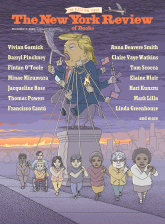The security clearance for Donald Trump may soon be up for review. The one he has came with the job and required no independent investigation of his character, judgment, personal conduct, financial history, abuse of drugs, respect for the law, allegiance to the Constitution, freedom from foreign influence, or mental and emotional health. It has been the government’s general practice to assume that presidents and other high-level officials continue to enjoy the nation’s trust on leaving office, but their access to classified information is a matter of custom, not of any right established in law. If he is out of office next January 20, Trump’s access to secrets would be a matter for the next president to approve or deny or ask someone else to weigh and consider, quietly in committee, or, perhaps, with a broader end in view, on the grand scale by a commission.
Trump himself has sometimes wielded a president’s control over secrets like a blunt instrument. Two years ago, angered by criticism, he noisily revoked the clearance of former CIA director John Brennan, denouncing him as “a loudmouth, partisan, political hack who cannot be trusted with the secrets to our country!” Trump added that he was “evaluating” nine other government officials for similar treatment but then let it drop. Even in Brennan’s case, as so often with Trump’s promises and threats, there was no follow-through, and it appears that Brennan’s access to secret matters remains intact.
With Brennan, Trump was acting vindictively. With Trump, a future president should act soberly and deliberately to resolve open questions that go to the heart of the ability of the United States to govern and protect itself—most importantly, to determine the true nature of Trump’s relationship with Russian oligarchs, Russian banks, Russian president Vladimir Putin, and the Russian intelligence service. Trump’s path is littered with large clues, among them his flattery of Putin, his refusal to credit intelligence findings about Russian interference in the election of 2016, his casual tolerance of the Russian seizure of Crimea and its covert war with Ukraine, and his many dismissive remarks about the NATO military alliance on which the security of most of Europe depends.
About Russia we confront questions that should not be allowed to go unanswered. Why do the Russians favor Trump? Why does Trump let them? Has he blocked American intelligence organizations from collecting information on these matters or sharing it with allies? Has he gone beyond the control of secrets to the purging of intelligence files? Which officers of the government have enabled him to establish, maintain, and extend his control over what we know? Trump’s true relationship to Russia is far from the only question about his tenure in the White House needing investigation, but it is probably the biggest one—unless his efforts to engineer his reelection are a bigger, darker, more troubling thing even than Russia.
Republicans have been afraid of looking into these matters, but they are not alone. Democrats are also fearful of what they might find, and there is a backdoor at hand. It would be a simple matter for the Office of the Director of National Intelligence (ODNI) to sidestep the question of whether Trump can be trusted. Trump can ask, but the ODNI determines what he shall receive. Former presidents wanting information these days are routinely given an iPad with text and graphics that may include intelligence at all four levels of classification, from Confidential to Sensitive Compartmented Information. Or they may get harmless gossip about foreign leaders mixed with analytical blather. ODNI decides.
It has been the custom of presidents to wipe the slate clean between administrations, leave troublesome questions to historians, and pick no big fights that would invite retaliation after the next change of administration. When Barack Obama took office in 2009 he called for no aggressive investigation into matters crying for explanation, like Vice President Cheney’s secret conversations with big oil companies while setting energy policy or the decision to invade Iraq. The biggest open question allowed to die was why the Bush administration ignored the many warnings it received of the terrorist attacks that killed thousands of Americans on September 11. Obama chose to leave these questions to the historians.
But Trump falls into a different category. Sixteen months ago the ABC News anchor George Stephanopoulos asked Trump if his campaign would accept information from a foreign government or turn it over to the FBI. “I think maybe you do both,” Trump said.
I think you might want to listen, there isn’t anything wrong with listening. If somebody called from a country, Norway, [for example, and said] “we have information on your opponent”—oh, I think I’d want to hear it.
Hear what? Obtained how? Promised when? For what reward?
Advertisement
To ignore these open questions about the Trump campaign in 2016 is to invite future candidates, in touch with other intelligence services, to do the same. Telling him he cannot be trusted, and explaining why to the world, will go beyond messy. But nobody has ever called Trump to account, and it is time.



